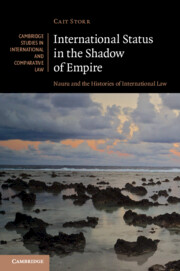Book contents
- International Status in the Shadow of Empire
- Cambridge Studies in International and Comparative Law: 150
- International Status in the Shadow of Empire
- Copyright page
- Contents
- Illustrations
- Acknowledgements
- Prologue
- 1 International Status, Imperial Form: Nauru and the Histories of International Law
- 2 From Trading Post to Protectorate, 1888
- 3 From Protectorate to Colony to Mandate, 1920
- 4 From Mandate to Trust Territory, 1947
- 5 From Trust Territory to Sovereign State, 1968
- 6 After Independence: Sovereign Status and the Republic of Nauru
- Bibliography
- Index
- Cambridge Studies in International and Comparative Law
1 - International Status, Imperial Form: Nauru and the Histories of International Law
Published online by Cambridge University Press: 20 August 2020
- International Status in the Shadow of Empire
- Cambridge Studies in International and Comparative Law: 150
- International Status in the Shadow of Empire
- Copyright page
- Contents
- Illustrations
- Acknowledgements
- Prologue
- 1 International Status, Imperial Form: Nauru and the Histories of International Law
- 2 From Trading Post to Protectorate, 1888
- 3 From Protectorate to Colony to Mandate, 1920
- 4 From Mandate to Trust Territory, 1947
- 5 From Trust Territory to Sovereign State, 1968
- 6 After Independence: Sovereign Status and the Republic of Nauru
- Bibliography
- Index
- Cambridge Studies in International and Comparative Law
Summary
Chapter 1 is the introduction to the book. It explains the book’s central argument, its theoretical orientation, and its relationship to existing accounts of Nauru’s international legal history. Commencing with a critique of dehistoricised accounts of the island’s story as a parable, whether of environmental limits or of political corruption, the chapter then outlines the theories of jurisdiction and bureaucracy that inform the book’s focus on the history of imperial administration, rather than on the conceptual history of international law. It moves to contextualise this approach in the field of international legal history, explaining its intersections and divergences with Marxist and Third World approaches to international law. The chapter concludes with a summary of the subsequent chapters on the protectorate, mandate, trusteeship and state periods, and highlights the particular perspectives on German imperialism, Australian sub-imperialism, and geopolitical competition in the Pacific that emerge through this account.
Keywords
- Type
- Chapter
- Information
- International Status in the Shadow of EmpireNauru and the Histories of International Law, pp. 9 - 44Publisher: Cambridge University PressPrint publication year: 2020



